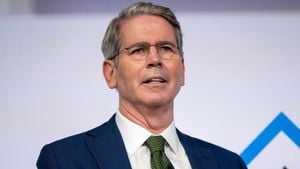The Climate Action Tracker (CAT) has delivered alarming news: the collective global efforts aimed at combating climate change have effectively reached a standstill over the past three years. This analysis, published coincident with COP29 in Baku, highlights the urgent disconnection between existing climate policies and the stark realities of the climate crisis we face. While many governments globally recognize the need for more decisive action to cut greenhouse gas emissions, the apparent urgency often fails to translate to real change on the ground.
One significant takeaway from the Climate Action Tracker's latest report is the concerning trend of stagnant emissions reduction efforts, leading to projections indicating global warming could hit alarming levels. Sofia Gonzales-Zuniga, who serves as the report's lead author from Climate Analytics, encapsulated this dilemma succinctly, stating: "We are clearly failing to bend the curve. The world is edging closer to dangerous climate thresholds, and the need for immediate and stronger action becomes ever more urgent." The report notes the average projected warming is currently estimated at 2.7°C above pre-industrial levels, with the worst-case scenario possibly exceeding 3.6°C.
The report reveals a paradox of sorts: even though the use of renewable energy sources, like wind and solar power, is skyrocketing due to increased investments—now double those for fossil fuels—the overall fossil fuel emissions have risen. A staggering quadrupling of funding for fossil fuel projects from 2021 to 2022 exacerbates this problem, reflecting systemic issues within governmental commitments and policy frameworks.
Prof. Niklas Höhne from NewClimate Institute, another partner at CAT, elucidated the current scenario: "While renewables growth is impressive, recent years have seen fossil fuels outperform significantly, driving emissions higher. The rapid rise of renewables is fraught with contradictions, yet it is clear they will outpace fossil fuels sooner than anticipated, paving the way for sharper emissions declines after 2030." This sentiment suggests the hopeful notion there may still be time for countries to pivot toward greener practices before it's too late.
An unexpected element discussed within the report relates to the potential impact of pending policy changes under U.S. political leadership. It outlines projections around President-Elect Donald Trump's planned climate policy rollbacks. While CAT’s calculations indicate limited impacts, such as warming levels potentially rising by 0.04°C if solely based on U.S. action, they caution against wider repercussions if combined with delays or rollbacks by other nations.
“The essence of the matter is whether countries can maintain momentum and continue advancing toward climate action goals. Though potentially destructive, U.S. policy rollbacks might be mitigated by solid clean energy initiatives initiated during the Biden administration,” Bill Hare, CEO of Climate Analytics, notes. This provides some reassurance if nations commit to collaborative action post-elections.
For substantial change to occur, the world’s largest greenhouse gas emitters need to take the lead. While CAT issued its 2035 targets calling for ambitious action from major countries—including China, the U.S., and India—these targets also reveal gaps where much is expected but currently lacking. Ana Missirliu, from NewClimate Institute and co-author of the report, stressed the necessity for developed nations to offer financial and logistical support to developing countries. Such support is pivotal for them to reach viable climate action levels. “Many developing countries can achieve meaningful climate progress only with substantial external assistance,” she said, summing up the equity challenge facing global climate action.
Even within COP29, where ambitious dialogues were anticipated, many key countries appeared to maintain contradictory positions, particularly with the Troika nations releasing strategies to extract more fossil fuels. This stark reality of progress juxtaposed with intentions reveals the need for hard discussions about aligning actions with climate objectives, as these nations collectively accounted for 63% of global emissions.
The CAT's global update paints a sobering picture. With no substantial new climate targets or net-zero pledges put forth during 2024, the situation is increasingly dire. Acknowledgments of the need to align policies with the Paris Agreement's 1.5°C goal remain unfulfilled. "If governments do not step up and align their 2030 targets with the 1.5°C limit set out by the Paris Agreement, we risk locking ourselves and future generations out of any possibility of sustainable living conditions," said Gonzales-Zuniga. The stagnant progress feels like peddling against the tide, with urgent action more necessary than ever.
Despite the grim news, the report does leave room for cautious optimism. Gonzales-Zuniga mentioned the possibility of emissions peaking due to inherent forces favoring renewable technologies, which may lead to unexpected curves toward reduction. She asserts, "The path to net-zero is fraught with challenges, yet the burgeoning engagement with renewable technologies might provide new avenues for growth, even if it remains to be seen how long it will take for populations to feel the effects of such transitions."
Looking forward, the challenges lie not just with policy language but with translating commitments made under international agreements—like those at COP29—into actual practices on the ground. This year’s climate developments urge continued scrutiny over domestic actions, fiscal contributions, and global cooperation, all necessary for steering toward climate positivity.
Failure to galvanize collective will to address these issues forgoes the potential to stabilize global temperatures and could lead us past climate tolerability limits, creating not just environmental disasters, but social challenges across nations still struggling to cope with changes already underway. Hence, urgent calls to action resonate across many forums, insisting on maintaining momentum toward the needed changes.
Climate Action Tracker's report stands as both a warning and a call to arms for countries around the globe. The time to act isn’t just now; it’s long overdue, and the solution lies not within isolated steps but cohesive, collaborative action. Only by aligning domestic policies with international climate targets can nations hope to shift course decisively toward mitigating the catastrophic effects of climate change.



